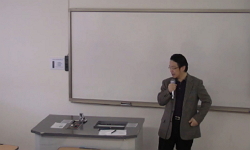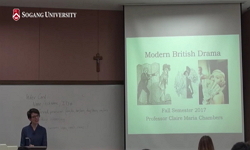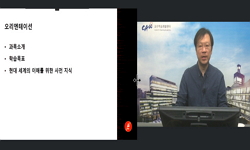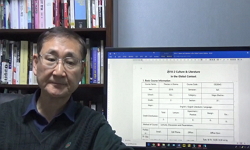Cultural sensibilities beyond postmodernity have appeared in the constantly changing society. What, then, comes after postmodernism? Roughly since the year 2000, each post-postmodern theory has approached the issue beyond postmodernism with its unique...
http://chineseinput.net/에서 pinyin(병음)방식으로 중국어를 변환할 수 있습니다.
변환된 중국어를 복사하여 사용하시면 됩니다.
- 中文 을 입력하시려면 zhongwen을 입력하시고 space를누르시면됩니다.
- 北京 을 입력하시려면 beijing을 입력하시고 space를 누르시면 됩니다.
부가정보
다국어 초록 (Multilingual Abstract)
Cultural sensibilities beyond postmodernity have appeared in the constantly changing society. What, then, comes after postmodernism? Roughly since the year 2000, each post-postmodern theory has approached the issue beyond postmodernism with its unique perspective in its refutation of postmodernism. First, as seen from a semiotic/dialectic perspective, performatism and critical modernism are future-oriented, but still reminiscent of modernism. Second, hypermodernism and supermodernity present society and culture against postmodernism, toward modernity, in terms of excess. Third, digimodernism and automodernity have strong links with modernity produced by digital innovations. From the three categories of post-postmodern theories, a new modernity as the post-postmodern common factor is deduced. First, they reclaim certain modern tenets as seen from a semiotic/dialectic perspective. Second, post-postmodern theories are formulated in their adoption of cultural sensibilities produced by digital innovations. As a result of change, postmodernism as cultural concept has lasted only a shorter period. On the other hand, postmodernity will not disappear for several hundred years just as modernity still lives on under the postmodern circumstances. If so, who can offer any definite answer for what post-postmodernism is? Or should we wait more for a definite theory explaining what the current post-postmodernism is?
참고문헌 (Reference)
1 Kirby, Alan, "Time for a New ‘ism’" 48-, 2007
2 Simpson, David, "Theory in the time of Death" 48 (48): 126-135, 2006
3 Hassan, Ihab, "The Postmodern Turn: Essays in Postmodern Theory and Culture" Ohio State UP 1987
4 Eagleton, Terry, "The I llusions of Postmodernism" Blackwell 1996
5 Rabaté, Jean-Michel, "The Future of Theory" Blackwell 2002
6 Ffrench, Patrick, "The Fetishzation of ‘Theory’ and the Prefixes ‘post’ and ‘After.’" 29 (29): 105-114, 2006
7 Kirby, Alan, "The Death of Postmodernism and Beyond"
8 Epstein, Mikhail, "Russian Postmodernism: New Perspectives on Post-Soviet Culture" Berghabn Books 1999
9 Zimmermann. Jens, "Quo Vadis: Literary Theory and Postmodernism" 53 (53): 495-519, 2004
10 Hickman, Larry A., "Pragmatism as Post-Postmodernism: Lessons from John Dewey" Fordham UP 2007
1 Kirby, Alan, "Time for a New ‘ism’" 48-, 2007
2 Simpson, David, "Theory in the time of Death" 48 (48): 126-135, 2006
3 Hassan, Ihab, "The Postmodern Turn: Essays in Postmodern Theory and Culture" Ohio State UP 1987
4 Eagleton, Terry, "The I llusions of Postmodernism" Blackwell 1996
5 Rabaté, Jean-Michel, "The Future of Theory" Blackwell 2002
6 Ffrench, Patrick, "The Fetishzation of ‘Theory’ and the Prefixes ‘post’ and ‘After.’" 29 (29): 105-114, 2006
7 Kirby, Alan, "The Death of Postmodernism and Beyond"
8 Epstein, Mikhail, "Russian Postmodernism: New Perspectives on Post-Soviet Culture" Berghabn Books 1999
9 Zimmermann. Jens, "Quo Vadis: Literary Theory and Postmodernism" 53 (53): 495-519, 2004
10 Hickman, Larry A., "Pragmatism as Post-Postmodernism: Lessons from John Dewey" Fordham UP 2007
11 Jameson, Fredric, "Postmodernism, or, The Cultural Logic of Late Capitalism" Duke UP 1991
12 Kirby, Alan, "Postmodernism is Out, Digimodernism is In"
13 Turner, Tom, "Post-Modernism in Planning and Design"
14 Eshelman, Raoul, "Performatism, or the End of Postmodernism" Davis Group 2008
15 Eshelman, Raoul, "Performatism, or the End of Postmodernism" 6 (6): 2000
16 Buchanan, Ian, "Non-Places: Space in the Age of Supermodernity" 9 (9): 393-398, 1999
17 Augé, Marc, "Non-Places: An Introduction to Supermodernity" Verso 1995
18 Samuels, Robert, "New Media, Cultural Studies, and Critical Theory after Postmodernism: Automodernity from Zizek to Laclau" Palgrave 2009
19 서영철, "Luhmann’s Systems Theory/Postmodernism/Literature" 새한영어영문학회 49 (49): 201-228, 2007
20 Eagleton, Terry, "Literary Theory" U of Minnesota P 2008
21 Lipovetsky, Gilles, "Hypermodern Times" Polity 2005
22 Gottschalk, Simon, "Hypermodern Consumption and Megalomania: Superlatives in Commercials" 9 (9): 307-327, 2009
23 Cobley, Evelyn, "Hard Going After Theory" 30 (30): 188-204, 2004
24 Armitage, John, "From Modernism to Hypermodernism and Beyond: An Interview with Paul Virilio" 16 (16): 25-55, 1999
25 Kirby, Alan, "Digimodernism: How New Technologies Dismantle the Postmodern and Reconfigure Our Culture" Contiuum 2009
26 Jencks, Charles, "Critical Modernism: Where Is Postmodernism Going" Academy 2007
27 서영철, "Beyond Postmodernism? - Early Post-Postmodern Art Movements" 한국독일언어문학회 (50) : 237-253, 2010
28 Armitage, John, "Beyond Postmodernism?" 15 : 2000
29 Samuels, Robert, "Auto-Modernity after Postmodernism: Autonomy and Automation in Culture, Technology, and Education, in Digital Youth, Innovation, and the Unexpected" the MIT Press 219-240, 2008
30 Eagleton, Terry, "After Theory" Basic Books 2003
동일학술지(권/호) 다른 논문
-
- 새한영어영문학회
- Cho Woonik(조운익)
- 2011
- KCI등재
-
- 새한영어영문학회
- 이혜진(Lee Hye-Jin)
- 2011
- KCI등재
-
- 새한영어영문학회
- 김창호(Kim Chang Ho)
- 2011
- KCI등재
-
- 새한영어영문학회
- 박령(Park Ryung)
- 2011
- KCI등재
분석정보
인용정보 인용지수 설명보기
학술지 이력
| 연월일 | 이력구분 | 이력상세 | 등재구분 |
|---|---|---|---|
| 2026 | 평가예정 | 재인증평가 신청대상 (재인증) | |
| 2020-01-29 | 학술지명변경 | 외국어명 : The New Korean Journal of English Lnaguage & Literature -> The New Korean Journal of English Language & Literature |  |
| 2020-01-01 | 평가 | 등재학술지 유지 (재인증) |  |
| 2017-04-21 | 학회명변경 | 영문명 : 미등록 -> The New Korean Association of English Language and Literature |  |
| 2017-01-01 | 평가 | 등재학술지 유지 (계속평가) |  |
| 2013-01-01 | 평가 | 등재학술지 유지 (등재유지) |  |
| 2010-01-01 | 평가 | 등재학술지 유지 (등재유지) |  |
| 2008-01-01 | 평가 | 등재학술지 유지 (등재유지) |  |
| 2005-01-01 | 평가 | 등재학술지 선정 (등재후보2차) |  |
| 2004-01-01 | 평가 | 등재후보 1차 PASS (등재후보1차) |  |
| 2003-01-01 | 평가 | 등재후보학술지 선정 (신규평가) |  |
학술지 인용정보
| 기준연도 | WOS-KCI 통합IF(2년) | KCIF(2년) | KCIF(3년) |
|---|---|---|---|
| 2016 | 0.17 | 0.17 | 0.18 |
| KCIF(4년) | KCIF(5년) | 중심성지수(3년) | 즉시성지수 |
| 0.19 | 0.17 | 0.441 | 0.06 |




 KCI
KCI






